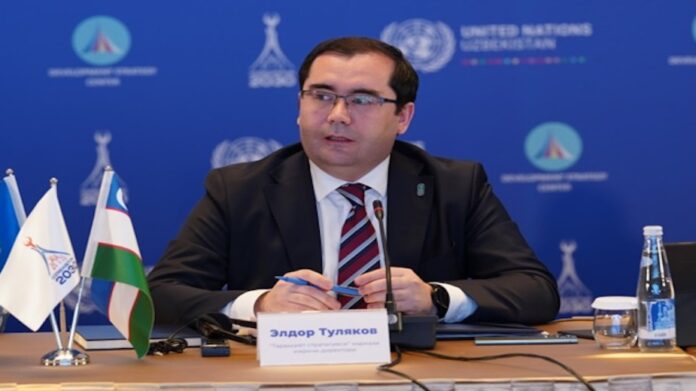- Advertisement -
By Rehan Khan
TASHKENT, Feb 17 (APP):Uzbekistan’s draft State Program for 2025 has emerged as a collective initiative shaped through extensive public and expert discussions, underscoring a commitment to transparency and inclusivity, according to Eldor Tulyakov, Executive Director of the Development Strategy Center.
Tulyakov emphasized that the program was not solely a government initiative but was enriched by deliberations across both chambers of parliament, political parties, labor unions, youth groups, and local communities. The open dialogue, widely covered by the media, ensured public engagement at every stage, allowing citizens to contribute meaningfully to the nation’s future.
Public awareness campaigns played a key role in gathering feedback, with around 100 conceptual and more than 1,000 editorial proposals from citizens and experts incorporated into the final document. Notably, the consultation process extended beyond Uzbekistan’s borders, with input from the international community and Uzbek expatriates, reinforcing the program’s comprehensive and inclusive nature.
A core focus of the State Program is improving the quality of life through environmental sustainability and a transition to a green economy. Key initiatives include expanding green spaces by planting trees in urban and residential areas, enhancing transport infrastructure with pedestrian and bicycle lanes, and adopting innovative water conservation techniques such as rainwater harvesting and wastewater recycling.
In pursuit of renewable energy goals, Uzbekistan plans to install solar panels at 74,172 facilities, generating an additional 785 MW of power. The country will also develop micro-hydropower plants with a total capacity of 225 MW, aiming to increase the share of renewables to 40 percent.
On the economic front, the government aims to stimulate the production of export-oriented goods, attract foreign investment, and integrate local products into global markets. Economic growth is projected at a minimum of 6% in 2025, with industrial growth at 6.1%, market services at 14.5%, and agriculture at 4.1%. Additionally, a targeted “firm-by-firm” support system will assist local entrepreneurs in accessing international markets.
Education and health-care reforms form another pillar of the program. The government plans to expand preschool education, establish mobile learning centres in remote areas, and promote digital learning tools. Certified Uzbek language and literature teachers will receive a 50% salary increase, while 500 foreign specialists will be recruited to schools. In health-care, modernization efforts will include upgrading medical facilities, introducing centralized laboratories, and implementing a digital queue system in hospitals to enhance service efficiency.
To combat poverty and boost employment, the government will establish vocational training centres, providing youth with skills aligned with industry demands. Investment projects will generate new job opportunities, driving economic resilience.
Environmental sustainability remains a priority, with subsidies offered for energy-efficient household equipment and the development of 100,000 hectares of green space in the Aral Sea region. Additionally, 32 million fruit and ornamental trees will be planted across 9,452 neighborhoods, along with 388 million flowers and shrubs along residential areas and streets.
As Uzbekistan moves forward with its ambitious road-map, officials hope for active public participation to ensure the program’s success. “These reforms are not just about today; they are about building a stronger foundation for future generations,” Tulyakov said.

